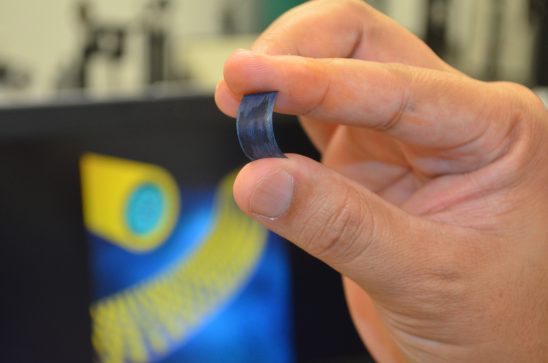Flexible Supercapacitors are being developed by a team of UC scientists. With an ability to store more energy and be recharged over 30000 times without degrading, this novel method could eventually revolutionize technology.
Nitin Choudhary, a post grad associate recently wrote and published an article in the academic journal ASC Nano. Choudhary states that if supercapacitors replace batteries, it will become possible to recharge a mobile phone in a matter of seconds and it will last over a week. Smartphone users will appreciate this as their phones hold less charge after about 18 months or so.
A universal problem discovered by scientists is that supercapacitors that hold as much energy as a lithium-ion battery tend to be larger. There is a need to use nanomaterials. Currently, the UCF team is experimenting with newly discovered two-dimensional materials that are only a few atoms thick to supercapacitors.
Yeonwoong “Eric” Jung assistant professor to the nanoscience technology center at UCF indicates that there has been a lot of problems in terms of cooperating these two-dimensional materials into the existing systems. Jung’s team has been experimenting with and developed supercapacitors composed of millions of nanometer thick wires that are coated with shells of two-dimensional materials.
The UCF team has realized the promise and potential of two-dimensional materials. Choudhary notes that in small electronic devices, their materials surpass the conventional ones in terms of energy density, power density, and cyclic stability. Cyclic stability is the number of times a device can be charged, drained and recharged before beginning to degrade. Whereas the ordinary lithium-ion battery has a cyclic stability of 1500 times, a supercapacitor does not degrade even after 30000 recharges.
The UCF’s Office of Technology Transfer has to issue a patent for the supercapacitor process. Although these are not yet ready for commercialization, the UCF team alongside their South Korean colleagues are working towards making this a possibility.
More News To Read
- Revolutionizing the World with Genetic Material Computers
- Clothing Now Being Made From Synthetic Spider Silk of All Things!
- A 360-Degree Camera That’s Affordable and Compatible with Android
- The Colonization of Mars Gets Closer, but Can Our Bodies Really Handle it?
- Is it Really Possible to Create a Livable Atmosphere Up on the Moon?











